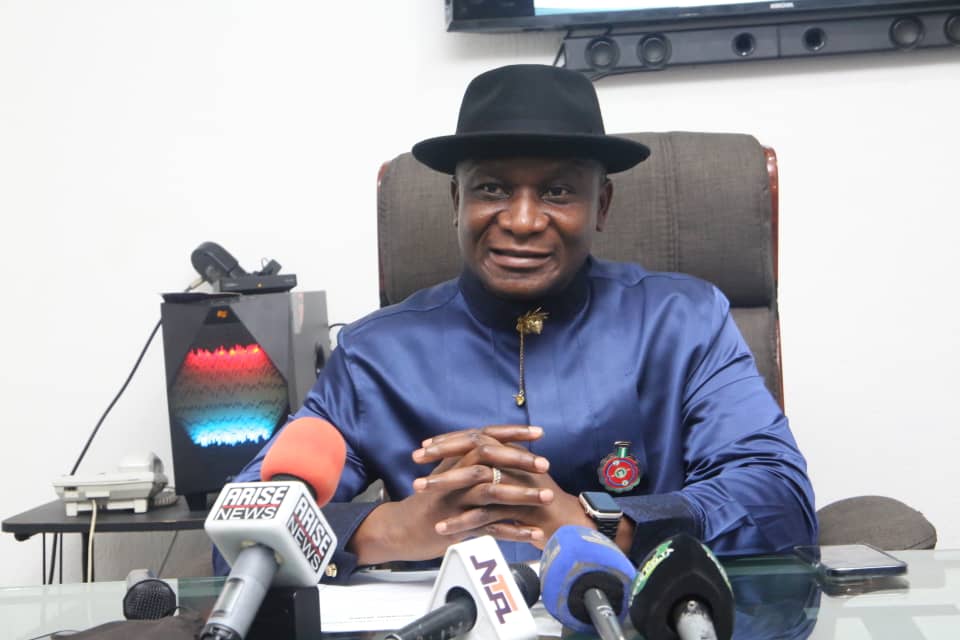Rivers
NDDC Trains Over 200 Niger Delta Youths In Alternative Dispute Resolution

Determined to sustained and promote a peaceful stability in the Niger Delta states, the Niger Delta Development Commission (NDDC) has trained over 200 selected youths drawn from the nine states of the commission on the use of Alternative Dispute Resolution mechanism (ADR)in settling conflicts and disputes in there various communities.
The one -day capacity Building workshop organised by the Department of the Dispute and Conflict Resolution, NDDC with the theme “Alternative Dispute Resolution (ADR) Mechanism: Facilitating inclusive youth Engagement for Transformative peace “held in Port Harcourt, yesterday.
Declaring the workshop open,the NDDC managing Director and chief executive officer, Mr Samuel Ogbuku said the essence of the workshop was to build the capacity of the youths in the region on conflicts management through Alternative Dispute Resolution(ADR) mechanism which will enable them handle conflicts in there communities,noting that conflicts is part of human society and happens every day in the society.
Ogbuku who was represented on the event by the Director Research, planning and statistics,Dr Patterson OGOM, stressed that Niger Delta region is at the centre of conflict due to its dominance in oil explorations and exploitations and there is the need to acquaint the youths who are always on the front burner during agitations on a more convenient peaceful approach to go about resolving conflicts with out it snowballing to crisis.
According to him,the workshop will exposed the youths on how to manage conflicts in there areas when they arise, adding that carrying arms and destruction of national critical assests in there communities was not the best option for achieving peace when conflict arises.
Ogbuku averred that Niger Deltans are noted for settling there disputes through dialogue and that informed the choice for the ADR workshop.
” What we want to achieve in the workshop is how to resolve and manage these conflicts when they arise.How the we explore other windows of dispute resolution, negotiation, dialogue and nip them on bud before they occur.ADR is Germaine to Niger Delta region.
The NDDC MD/ CEO urged the participants to take the workshop serious so that they can take the message back to their various communities and States.
Also speaking, the Ag Director, ADR NDDC, Godwin Ayewumi Ogedegbe esq, disclosed that since the inception of the present NDDC management led by Mr Samuel Ogbuku the region has not witnessed crisis as it was in the past , adding that the commission has been proactive and preventive in conflicts management in the region.
Ogedegbe averred that the training was designed to teach the youths an alternative ways of resolving conflicts when they happen or occur rather than resorting to arms carrying and destruction of critical national assets in their domain, adding that Alternative Dispute Resolution (ADR) is the best way to resolving and managing crisis.
He opined that peace is critical to the commission and the region, noting that when the youths destroy the oil installations and other critical national assets in the region it will affect revenue accruing to the commission and in turns affects development in the region.
“They are going to preach the message learnt here to their fellow youths that there are other ways of resolving conflicts despite carrying arms or destroying oil facilities in there communities as such acts can’t bring peace.”he stated.
Our correspondent reports that the participants were drawn from Rivers, Delta, Akwa ibom, Edo, Cross River and Bayelsa states
Others include, Imo, Abia and Ondo states.
Akujobi Amadi
Rivers
Fubara Restates Continued Support For NYSC In Rivers
Rivers
Health Comm Charges Youth To Take Advantage Of Innovation Hub
Rivers
Andoni Chair Assures Safety After Cult-Related Attacks In Oyokotoro
-

 Niger Delta3 days ago
Niger Delta3 days agoPDP Declares Edo Airline’s Plan As Misplaced Priority
-

 Sports4 days ago
Sports4 days agoSimba open Nwabali talks
-

 Nation4 days ago
Nation4 days agoHoS Hails Fubara Over Provision of Accommodation for Permanent Secretaries
-
Niger Delta4 days ago
Stakeholders Task INC Aspirants On Dev … As ELECO Promises Transparent, Credible Polls
-
Niger Delta3 days ago
Students Protest Non-indigene Appointment As Rector in C’River
-
Rivers4 days ago
Fubara Restates Continued Support For NYSC In Rivers
-

 Oil & Energy4 days ago
Oil & Energy4 days agoNUPRC Unveils Three-pillar Transformative Vision, Pledges Efficiency, Partnership
-

 News4 days ago
News4 days agoDiocese of Kalabari Set To Commence Kalabari University

